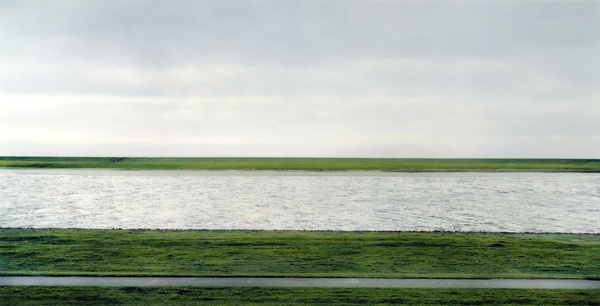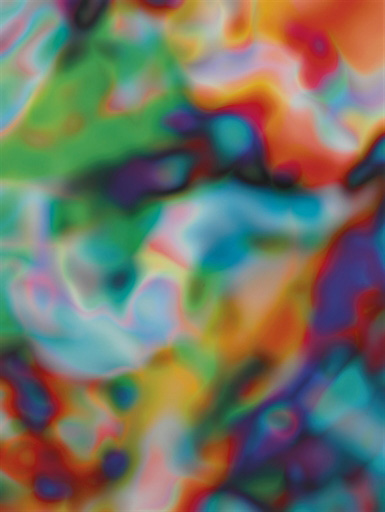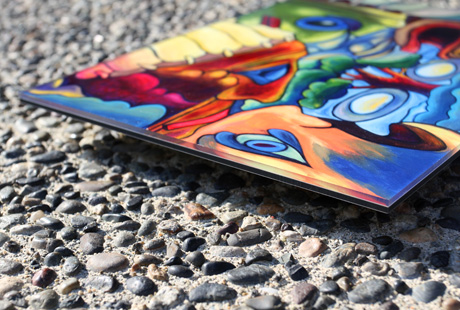| FACEMOUNTING FOR ARTISTS
|
 |
|
Over the past two decades, contemporary photographic and digital artists have increasingly been drawn towards frameless methods of displaying their artwork. Amongst artists, facemounting has emerged as a popular alternative to traditional glazing. Its benefits are myriad, from print stability to perceived increases in colour saturation. However, this method is not without its detractors and many of the arguments about facemounted images concern their conservability. As an artist, your photograph or digital image does not merely end with the physical print, but considers its entire presentation from print, to display, to its final reception by the viewer.
This article discusses the benefits and drawbacks of facemounting, while providing advice about the process as it relates to practicing photographic and digital artists. Read our article describing the facemounting process here. |
History
The history of facemounting began in Switzerland in the early 1970's with Diasec, a company which patented the first process of adhering a photographic emulsion to a sheet of acrylic with silicone rubber. With the contemporization of art, photographers experimented with all aspects of their practice from subject matter, to blowing up prints to the size of historical paintings, to new methods of displaying their artworks.
Facemounting became associated with this new, contemporary aesthetic and was popularized in the early 1990's, gaining favour within the art world as photographers increasingly sought to use it for large scale works requiring print rigidity, maximum colour, and a clean finish. The public would become enamoured with the new method and its popularity has resulted in an increase in the market price of facemounting. |
| Benefits and Considerations
|
 |
Appeal
The most appealing aspect of facemounting is the clean and sleek aesthetic of the acrylic-faced image. Adhering the print directly to the acrylic surface eliminates the reflection and refraction of light that occurs between the glazing and the print in a conventional frame. Further, it provides depth and an impression of three dimensionality to the image rather than simply pushing it back as in traditional framing. As a result, the print appears 'wet', acquiring richer hues and an internal luminosity not apparent without facemounting.
In addition to heightening the colour brilliance of the image, facemounting is a minimalist method of presenting artwork. This process eliminates peripheral objects that potentially distract from the printed subject, ensuring viewers will only recall the photographic image. |
|
While some artists may not be concerned with the materiality of their work, it is important to consider one's method of exhibition and in this case the statement which facemounting makes. This display collapses the distance between the print and the viewer by removing what is normally the space between the print and the glazing.
This aspect, coupled with the aforementioned three dimensionality, transforms the ephemeral paper print into something more tangible and permanent, like a photographic 'sculpture.'
Consider the works of celebrated, contemporary German photographer Andreas Gursky (1955), one of the first artists to exhibit facemounted images and the artist behind the most expensive photograph ever sold. His traditionally monumental (wall-sized) prints are no less immersive experiences in their smaller (5ft x 3ft) variations. Although stunning photographs on their own, facemounting aids Gursky's resizing by its inevitable effect of drawing people into the 'alternate space' within the image. |

Andreas Gursky, The Rhine II (1999) |
Artistic Intent
A facemounted image shows clear artistic intent as it is the final display method of your artwork. With a paper print a collector may independently select a frame for the print, or even reframe a finished piece. While this gives collectors more flexibility it also runs the risk of compromising the artist's original vision or intent with an unadvised display of the artwork. Facemounting allows the artist to control all aspects of his or her piece thereby ensuring their concept is carried through the entire work.
This process is therefore an effective display method for conceptual, contemporary, and abstract imagery. Traditional subjects, ie: portraiture and bucolic landscapes, may benefit more from conventional framing. Read our article on how to select the right frame here. |

Thomas Ruff, Substrat 1 III (2014) |
Conservation
For gallerists and collectors, facemounts present unique conservability issues. Due to acrylic's electrostatic attraction to dust, surface cleaning is ongoing. Because facemounting is a permanent process, damages to the acrylic surface from scratches to chemical stains are major concerns as they are irreversible in most cases.
It is therefore important when dusting a facemount to use non-abrasive, lint-free materials, ideally forced air (air bulb) or lambswool, with minimal contact to the acrylic surface. If a cleaning fluid is to be used on the surface, water is ideal as other cleaning fluids may react with the acrylic or leave unwanted residue.
Another conservator's concern is the potential of delamination. Improperly laminated facemounts will result in the layers of dibond, print, and acrylic separating even in a matter of weeks. However, this should not be a concern with our pieces as we take extreme pride in our top-quality lamination process. Combining this with archival-quality inks and UV-resistant acrylic to prevent print discolouration, KeenART Media will ensure the beauty and longevity of your artwork. |
| Summary
|
 |
For artists working in the contemporary sphere, facemounting is an excellent option to showcase stand-out digital and photographic works. While this option does require particular care to maintain its original, pristine state, so too do other forms of art. Its popularity with the public and the art world has meant its value is an investment, but its unparalled colour, tangibility, and artistic statement ensure it is an investment worth making.
To produce your own digital image or photograph in an acrylic facemount, simply upload your file to our website to get started! For information on our facemounting options, click here. |

|
|
References M. Smith (2012), P. Wilson (2015), C.D. Vernon (2007), E. Murphy (2007)
If you have any questions about any of the products or services offered here at KeenART Media, please do not hesitate to contact us. Our knowledgeable staff are always happy to answer your enquiries and provide suggestions or advice.
|


|

|
Custom-Made Picture Framing, Custom Stretcher Bar Frames
, Custom Artist Canvas, Custom Canvas Stretching, Canvas transfer & Dry Mounting Services
A division of USA On Canvas -
|
|
© 2002-2026 - KeenART Media Ltd.
|
|
| |
|

